Jorgensen Turns In Another PR; Okagbare Puts Up Historic 100m
Jorgensen Turns In Another PR; Okagbare Puts Up Historic 100m
Gwen Jorgensen's 10,000m personal best and Blessing Okagbare's wind-aided 10.72 were some of the top professional performances of the weekend.
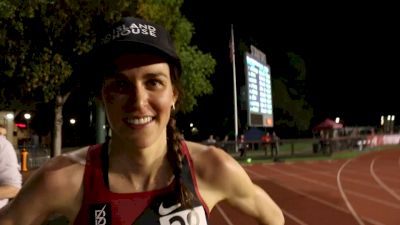
Late March and early April is a transition time in professional track and field. In the United States, early spring means the first exposure to strong competition outdoors. But it’s also the beginning of a season that could run through to September, an eight-month slog that requires a judicious approach to doling out effort.
It’s also one of the points of the year where collegians and pros overlap. And since the two groups are at vastly different points in their training, collegians often come into these meets sharper. Hannah Cunliffe, who ran her first professional race this weekend, made mention of this after running the 4x100m relay on Saturday. During her college years, she was the one beating pros in the spring. Now, she’s on the other side—running her first race in late March while many NCAA runners have been running at a high level for months.
However, amidst all the incredible college performances this weekend (and there were plenty of incredible performances), there were some professional performances to take note of. For this week’s recap, I looked three of the major meets on the schedule: Stanford Invitational, the Texas Relays, and the Florida Relays.
Gwen Jorgensen Continues To Impress, Brianna Rollins-McNeal Returns
As expected, the Stanford Invitational in Palo Alto turned in the best distance results of the weekend. Gwen Jorgensen continued her voyage into professional distance running with a victory in the 10,000m. The Olympic champion in the triathlon now has personal bests of 31:55 in the 10,000m and 15:15 in the 5000m, both from this year.
On Friday night, she ran most of the race with multiple-time NCAA champion Karissa Schweizer as well as Carrie Dimoff. The group traded off the lead (Schweizer was running the first 10,000m of her career) throughout the race, clicking off laps around 76 seconds. Jorgensen and Dimoff eventually broke away from Schweizer and Jorgensen closed in 71 seconds to win the race.
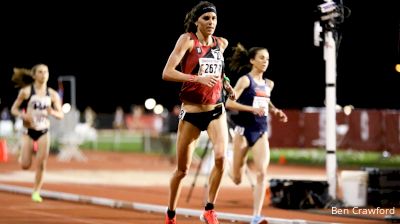
Jorgensen’s ultimate goal is the marathon, and both of her track races this year indicate she’s capable of running under 2:30 in the distance. But before that happens, it would be interesting to see how she’d fare in a 10,000m after a couple more months training and with deeper competition. If there was a global championship this year, perhaps that would happen at the U.S. Championships—one of many "what-ifs" for the non-championship year.
Dimoff had a huge breakthrough herself, running 31:55 to chop almost 50 seconds off her personal best.
In the men’s 10,000m, Lopez Lomong made his debut with a 28:21 for second place. Lomong, who’s raced everything from 800m to 5000m, closed in 60.9 seconds but couldn’t stay with Alabama’s Vincent Kiprop. All told, the race was a good sign for Lomong. Every distance race is now competitive at the U.S. Championships, but the 10,000 offers the most navigable path to a top-three finish for the American-Sudanese athlete.
Nijel Amos didn’t hold anything back in the men’s 800m. The Olympic silver medalist looked like he was in Diamond League form already, posting a 1:44.65 to smash the meet record. Nobody else in the race broke 1:48. Take a look at the gap Amos creates in the final 200m.
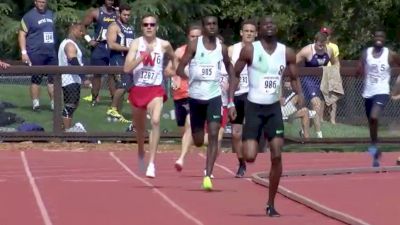
Drew Hunter placed fifth in that race. The 20-year-old ran 1:49.73 to cap off his first weekend of racing in eight months. The night before, Hunter ran 3:39.75 to finish runner-up to Peter Callahan’s 3:38.41 in the 1500m. Hunter’s absence from racing was the result of a stress fracture in his foot. He explains more about his time away from racing and his current goals in this interview from Stanford.
Although Palo Alto isn’t known for hosting fast times in the shorter distances, Brianna Rollins-McNeal dropped a world-leading 12.62 in the women’s 100m hurdles. This was her first race since her gold medal-winning run in Rio in 2016. Rollins-McNeal was suspended all of 2017 because of missed drug tests, but it looks like the time away from the track didn’t slow her down much.
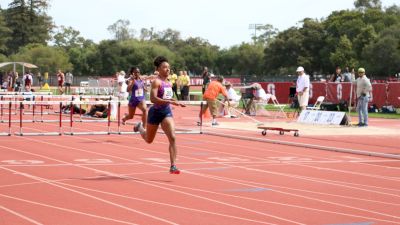
After this weekend, Rollins rejoins the deep American hurdle squad that went one-two at the 2018 World Indoor Championships.
Okagbare Puts Up Historic 100m Time, Lavillenie Holds Off Mondo
In Austin, Texas, Blessing Okagbare ran a wind-assisted 10.72 in the 100m to win by over two tenths of a second. Using a conversion, the 10.72 with a 2.7 meters/second wind at her back converts to a 10.87 with no wind. But even if you leave the wind in, this result had some significance—because of how few women have graced the low 10.7s in any conditions.
How few?
☄️ 10.72w Blessing Okagbare Nigeria ?? confirms that she is better than ever, 1 week after her 22.04 African Record at 200m
— PJ Vazel (@pjvazel) March 31, 2018
Only 5 women have ever run faster (all conditions)
10.49 Flo-Jo
10.64 @CarmelitaJeter
10.65 @marionjones
10.70 @realshellyannfp
10.70 @FastElaine pic.twitter.com/y10V01bU5J
The 29-year-old from Nigeria has been on a tear this outdoor season. Last week, she ran 22.04 in the 200m to set a personal best and break the African record. Two of Okagbare’s three global medals have come in the long jump. Performances like these show that perhaps she has more sprinting medals in her legs when the global championships return next year.
Also in Austin, an energetic crowd packed into the stands in the northwest corner of the bleachers to watch world record holder Renaud Lavillenie face off against high school phenom Mondo Duplantis in the pole vault.

The competition didn’t disappoint. Duplantis broke his own world junior record, clearing 5.92m on his third attempt, to join Lavillenie and Shawn Barber as the only men over that height. No one ended up clearing the next heigh (6.02m) and Lavillenie prevailed on misses.
After the competition, Lavillenie spoke about competing against Duplantis and vaulting in a Michelin Man costume for a commercial in France.
Christian Taylor Shows His Versatility, Jackson Unretires
Sydney McLaughlin’s three races in Gainesville rightfully commanded a bulk of the attention from the Florida Relays. Most of the big-name pros didn’t race their best event, opting for off-distances or relays. Hurdle world record holder Keni Harrison ran in the same 200m heat as McLaughlin and posted her fastest time ever in the event—a 22.81 to finish third. Kori Carter, 400m hurdle world champion, took fifth in 23.23.
The men’s 400m produced a few interesting storylines. Christian Taylor showed that if he wasn’t focused on breaking the world record and winning more gold medals in the triple jump, he could be a pretty good 400m runner. He ran 45.48 to take second. The last time he ran a serious 400m also came in a non-championship year. Taylor put up a 45.17 in 2014, giving a window into his immense talent.
Bershawn Jackson finished two spots behind Taylor in fourth place, running 46.50. The three-time world champion in the 400m hurdles provided some clues that he was coming out of retirement when he made an appearance at the 49er Classic last weekend. Now, he has made it official. Welcome back, Batman.
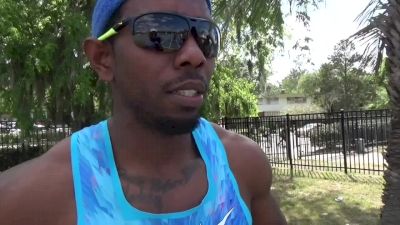
Elsewhere in Gainesville, Olympic 100m hurdle champion Omar McLeod ran the 100m and 200m in 10.32 and 20.49, respectively. 400m runner Steven Gardiner stepped down in distance to run a personal best of 20.20 in the 200m. Tori Bowie and Shaunae Miller both made appearances in the 4x200m relay, making up one half of a completely unfair team. After the race, Bowie said she’d love to long jump at the Olympics in 2020.